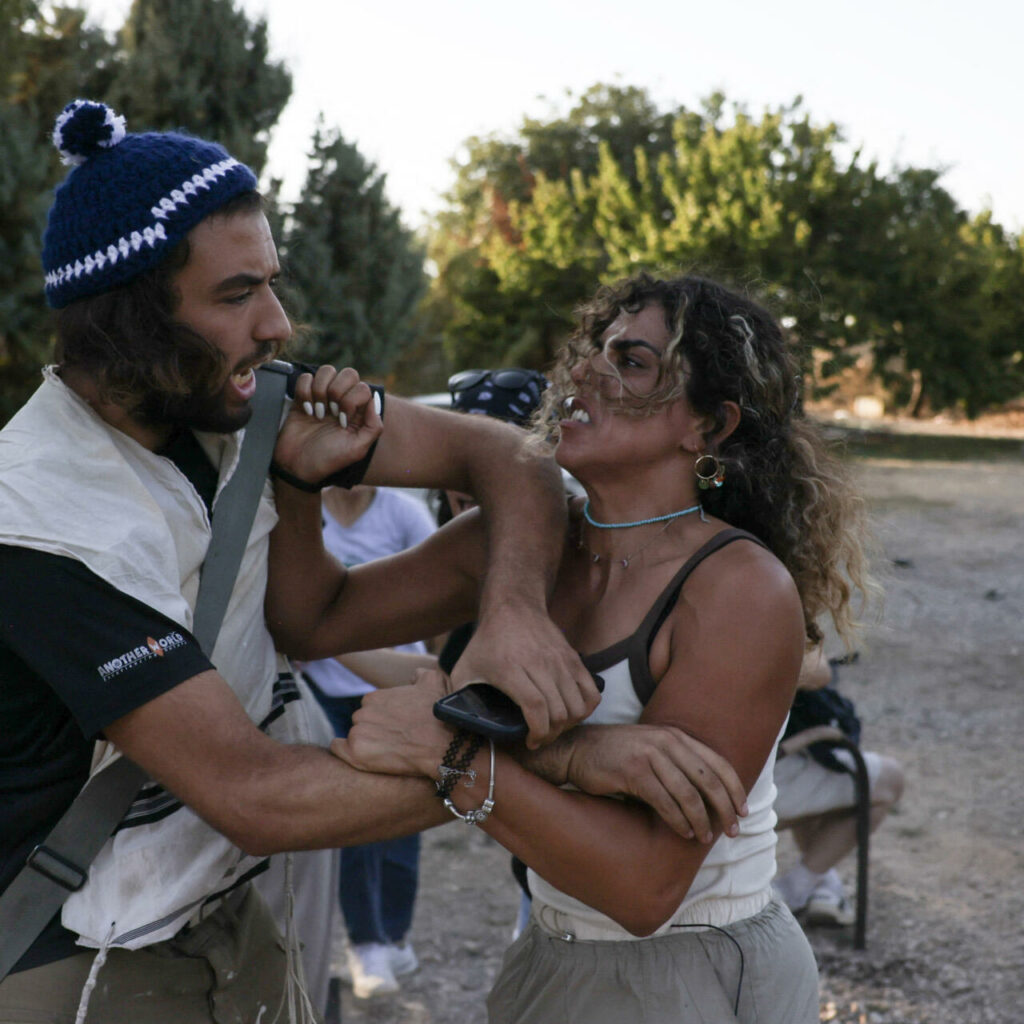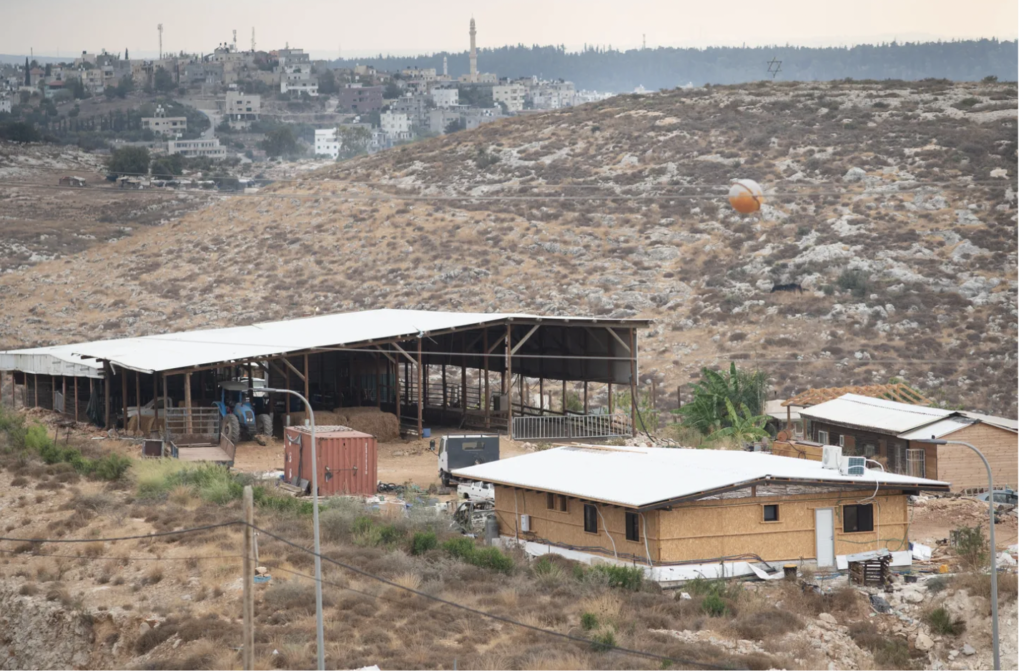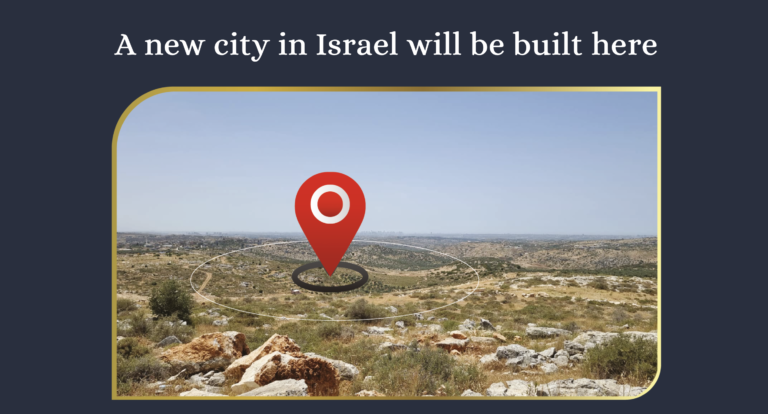By Andrea Tucci,
The internal road of the settlement of Ma’aleh Shomron leads to a virgin trail in a nature reserve, that leads to the farm Havat Dorot Illit Upper Dorot.
Atop the hill is the home of the farm’s owners: Ben Yishai Eshed, along with his wife Leah and their two small children. One family and a herd of cattle that lives close to the area where a veteran Palestinian communities resides. At some distance from the family’s there is makeshift headquarters of the soldiers from the Israel Defense Forces regional defense unit who are guarding the settler outpost.
Dorot Illit constitutes part of an experimental educational, non-profit project, for young people who struggle to integrate into formal settings, which involves the establishment of agricultural farms that serve as a kind of boarding school for the youth, where they are taught to love and work “their land.” . In 2023, the nonprofit that operates the farm received almost 400,000 shekels (about $110,000) from the Negev and Galilee Development Ministry. Until the end of 2023, the farm was also supported as part of a program for at-risk youth initiated by the Jewish National Fund.
This past month, settlers from different farms and its environs arrived at a nearby Palestinian village, attacked them with iron pipes, clubs and stones and many village residents were hospitalized. Complaints filed by the villagers were dismissed by the police, who claimed it was unable to locate the suspects.
Palestinians says that abusive acts were perpetrated by the people from the farm and the live in a climate of fear since the establishment of these outposts.

Palestinian activist Alice Kisiya, right, whose family land was taken over by armed Israeli settlers, confronts a settler in the area of al-Makhrour in the occupied West Bank, near Beit Jala, on August 22, 2024.
The Havat Dorot Illit is one of the most extreme and unruly places in the West Bank, which has became a focal point of friction and violence almost from its very inception enjoys a hefty slice of public funding. And it’s not the only one.
By early 2017, there were 23 such outposts scattered across the West Bank. But since then there has been a strong surge in their number, with some 65 new ones established within just seven years.
Tens of millions of dollars in public funds are being injected into these communities directly by government ministries, the local authorities in the territories and the World Zionist Organization’s Settlement Division. Concurrently, Finance Minister Bezalel Smotrich has announced that he is working to have the farms formally legalized.
The outpost farmers are now working shoulder to shoulder with the state, which is granting loans for establishing their communities, allocating contracts for pasture land, hooking them up to infrastructure, underwriting their security needs, purchasing equipment for them and also offering pasturing grants and even business entrepreneurship grants, whose underlying purpose is the forceful takeover of land and systematic dispossession of Palestinian residents.
Unfortunately in many cases the farming and shepherding outposts have become a breeding ground for extreme act of violence to the Palestinian.
The vanguard force is often comprised of at-risk teenagers themselves who led assaults and harassment that forced Palestinian residents of another village to flee.
The international arena has not been indifferent to these developments. In the past year, the United States, Britain and other countries have imposed sanctions on the owners of different farms, but the young volunteers living in these communities are not affected by the international condemnation.
From the observation point at the top of the hill, no binoculars are necessary for viewing new developments in the area. At the foot of Nili lies Magnezi Farm, named for its founder, Yosef Chaim Magnezi, who lives there with his wife Devora and their toddler son. Magnezi covers about 5,000 dunams (1,250 acres – 506 Hectars ) of farmland, basically the size of the city in central Israel.

Photo: Magnezi Farm – source David Bachar
Magnezi Farm has extended long tentacles into Palestinian-owned land around it by means of new dirt paths. Magnezi, for his part, stated in an interview, “There are going to be Jews in these hills.
Magnezi told the Channel 7 News: “The young people, to their credit, have this fire in their eyes. They’re the ones who need to do these crazy things… ” Magnezi himself had been investigated on suspicion of making threats and of trespassing in an incident that took place in a nearby Palestinian village. The farm was a focal point of “disturbances and friction.” but Magnezi Farm, receives generous government funding yearly. Also the Agriculture Ministry has provided a modest grant to the farm and another support for its operations comes from the Jewish funders network,JNF .
The JNF during the past three years has transferred 5.5 million shekels ( around 1.5 million of Euros) to its farm youth program, which helps volunteers on agricultural and shepherding outposts and is defined as” a program for assisting at-risk youth”.
In the view of left-wing activists, projects promoted “as serving at-risk youth” have always been an effective means for taking over land in the West Bank. Some farm are built without a permit, But then they are legalized and also receive support from the Israeli armed forces.
The outposts in question are spending the 54 million shekels (13 million of Euros) over two years, to acquire utility task vehicles, drones, cameras, generators, electric gates, illumination poles, fences, solar panels and more. However, Peace Now ( a non-governmental organization, liberal with the aim of promoting a two-state solution) reports that devices used for security purposes have recently been installed in at least 30 farms, including five on which international sanctions have been imposed for violent acts against Palestinians.
Besides seizing land, the farmers often act as “self-appointed inspectors” who deal to check the illegal Palestinian construction, by means of drones, threats and reports to the authorities. They have been joined by so-called land patrol departments set up by various councils, to which the Settlements Ministry has allocated tens of millions of shekels since 2021. Over the past two years, the patrol bodies have received an average of 35 million shekels per year ((8.5 million of Euros), in order to prevent planning and construction violations and the seizure of state lands. Even though it is the Civil Administration that should have the authority to supervise Palestinian construction. This funding has been used to acquire all-terrain vehicles and to install cameras in open areas, for partial funding of salaries and for building roads and closing off areas.
The farms are examples of outposts that are presented to the public as places of leisure and recreational activities, but whose real raison d’être is “hidden”.
Some farm is also known as a “country hospitality compound. However, in a tour to a farm which was documented by the BBC last month, the ultimate purpose for which the place was established open areas [ areas of 7 sq. km, a size of a small city] which no can enters and no one can even approaches …
Most of these teenagers there are “people who dropped out of school because of learning disabilities or incompatibility with the system, sometimes due to religious incompatibility or because of ADHD (Attention deficit hyperactivity disorder) Are boys who got into trouble with the law and supposed to be sent to a rehabilitative framework, but sometime are able to persuade the judge to allow him to reside on a farm instead.
In the past the farmers themselves would go to confront the Palestinians and the activists. Now these youngsters are on the front line.
This is not what a rehabilitation process of at-risk youth should look like. Places like those are fertile ground for the development of hate. And hate is not rehabilitation.
Rabbi Arik Ascherman, who is the founder of the human rights organization Torah of Justice and who has been attacked a number of times during his years of activism, says: “The farm owners perceive themselves as educators, Something I obviously contest. Beyond the wicked things these youths do to Palestinians, we also need to consider what the stay on the farms does to them.”
The JNF stated this program accords youth an opportunity to integrate into various frameworks in Israeli society, as active, contributing citizens: “This is a valuable educational program that educates youth to love the country, through which youths are enveloped by a learning environment that includes, among other elements, Zionist education aimed at getting to know the land, vocational training in various fields, basic life skills and proficiency, and more”.
It’s that ” and more” that worries us…




